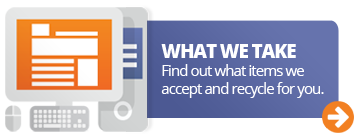
10th February 2016, Melbourne: New research commissioned by e-waste collection and recycling service TechCollect reveals that while the majority (95.7 per cent) of Australians agree that recycling electronic waste (e-waste) is important, almost half (45 per cent) do not currently recycle, with many citing lack of awareness of their options or concerns over data security as key reasons.
The research also found that the majority (80.7 per cent) of respondents admitted that they place more importance on household recycling like cardboard, glass and plastic than they do on recycling their e-waste.
When asked what the biggest barriers to recycling were, the top responses were ‘I’m not sure where to start’ (46.1 per cent) and ‘I’m worried about my personal data getting into the wrong hands’ (38.7 per cent). Other responses also showed that many didn’t know where drop off points were, or even that they could recycle their old technology in the first place.
Nearly half of respondents (43 per cent) also admitted to putting their e-waste on the nature strip for council collection. Carmel Dollisson, CEO of TechCollect, said this can be hazardous to the environment – with individuals often being completely unaware of the potential damage – as well as providing no guarantee of responsible recycling that would recover the raw commodities for use in new products.
“Often people will try and do the right thing, without realising that kerbside collections don’t always provide a guarantee that the product won’t end up in landfill.
“By recycling televisions and computers through a program like TechCollect we ensure that non-renewable resources are safely recovered, so that they can be used again in future manufacturing, as well as ensuring that product containing materials which can be dangerous to both people and the environment if put in landfill, are instead correctly recovered or disposed of.”
Key findings from the survey:
• 91.8 per cent of respondents believe there should be better retail incentives in place to make it easier for them to recycle their e-waste
• Only 11.5 per cent strongly agree that recycling e-waste is a top priority for their household
• 70.6 per cent didn’t know that they could recycle their power cords
• Just more than half (50.3 per cent) of respondents have more than three unused devices at home, and 36.7 per cent have more than five unused electric cords/cables that are collecting dust
• 24 per cent are holding onto their old technology out of fear that they might need it one day, and 38.6 per cent just don’t know what to do with it
“Information and awareness are key to the success of the National Television and Computer Recycling Scheme which TechCollect operates under. An important priority for the Scheme is to educate the public to understand the important role we all play in responsible e-waste recycling. In the digital age where technology consumption is at an all-time high, this has never been more prevalent,” said Dollisson.
While data security is an important concern, it is relatively simple to address before disposing of your e-waste. It’s important to remember to always permanently erase personal data from any computer, tablet, or laptop you plan to recycle. For more information on how to do this contact the manufacturer of your device or search online for data wiping services.
To find out more information about TechCollect or to find a designated drop-off site closest to you, visit: https://techcollect.com.au/










